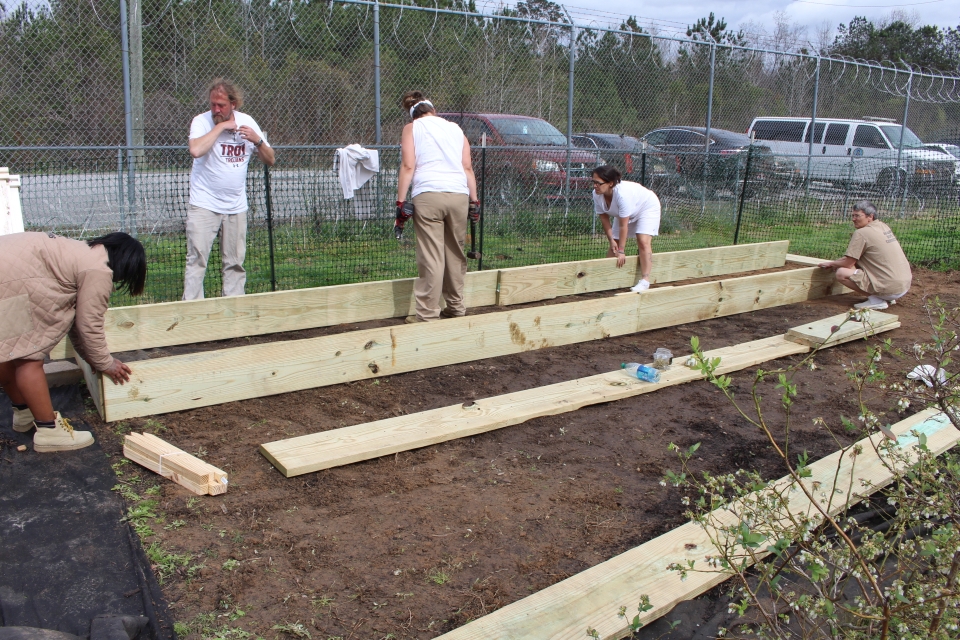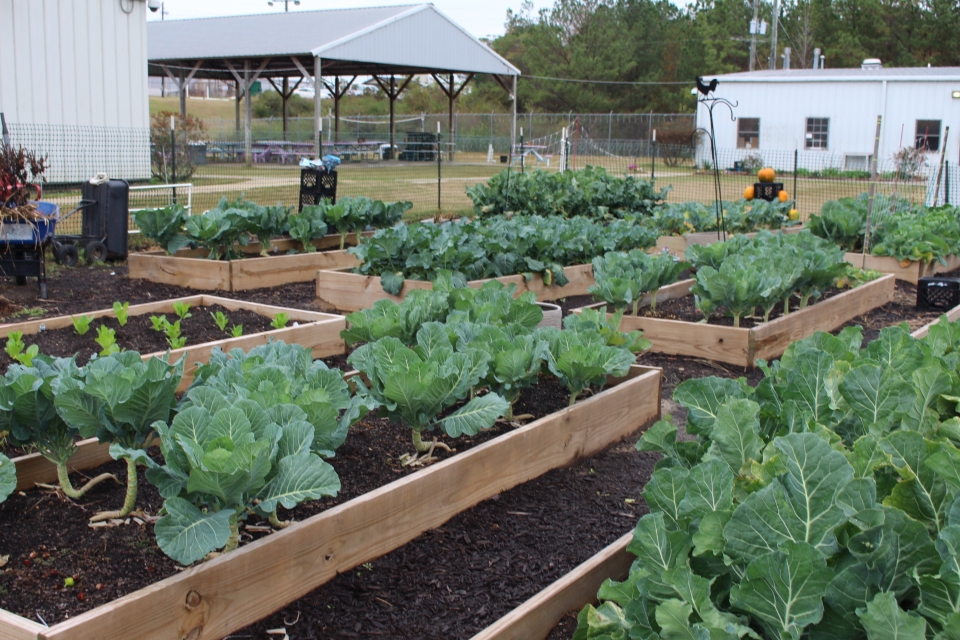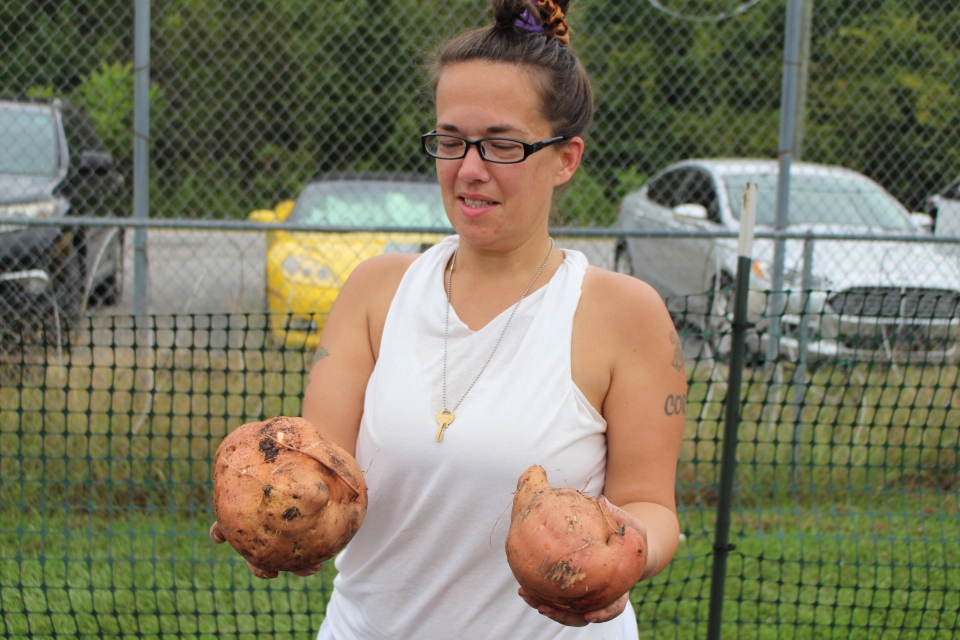The Beginning
After researching food allocation and prisons, Dr. Everhardt and Dr. Carmody created a partnership program with the Julia Tutwiler Prison for Women in Wetumpka, Alabama.
Gardening in the Alabama Prison System, formerly known as the TROY-Tutwiler Garden Program, started in January 2019, it is an educational program for female incarcerated participants run by Dr. Everhardt and Dr. Carmody, along with hands-on student involvement. The program was created to teach incarcerated participants about horticulture and nutrition through 15-week Fundamentals of Gardening Classes held every Wednesday, year-round.
In addition, there is also an advanced class for those incarcerated participants that have already graduated from the fundamentals class. These classes are also held on Wednesdays.
Troy University offers a certificate of completion for those incarcerated participants that finish these 15-week classes.

“I love learning about plants. I love to eat the food. I just ate my first blueberry in 15 years. I thank Jesus every day for Troy University.”
Garden Class Participant | 2019
“It helps me with my anxiety. It gives us fresh vegetables. It helps me understand how to grow flowers from seed to big flower. It helps bring people together.”
Garden Class Participant | 2021
Win-Win
This TROY-Tutwiler Garden Program is a win-win for both students and incarcerated participants. During the classes, the incarcerated participants have access to healthy food and obtain skills that could help them secure employment upon release. And, the students involved, which is typically one to two at a time, are extremely hands on in data collection, curriculum development, teaching garden and nutrition classes, gardening with the incarcerated participants, promoting the program and more.
Making a Difference
This program is a lifeline for the women at Tutwiler Prison. After they join the program, a commitment is made to educate and support them. This commitment continues after they are released. The goal is to make the women productive members of society that never return to prison.
Around 120 incarcerated participants have participated in this program since it started, and there are success stories to tell about. One story in particular is about an incarcerated participant that left Tutwiler Prison in January 2020. She had completed the 15-week Fundamentals of Gardening Class and earned a Certificate of Completion from Troy University. She secured employment, a home and a car. She is still in contact with the program and is now considering going to college with encouragement from those in the program.

“Before this program came to Tutwiler, I was in a dark hole for 13 years. This program pulled me out of my hole. It has given me hope in a place that does give me any.”
Garden Class Participant | 2021
“It’s like I’m out of prison in my front yard. At times, when I feel like I’m going to explode, I go up front and sit on the edge of the raised flower bed and just take it all in; the beauty and the peace.”
Garden Class Participant | 2021

Quote from Warden Wright
“The implementation of the Gardening Program at Tutwiler has been beneficial in many aspects. The program has had a transformative effect on the women as they're able to experience the process of growth first-hand, nurturing plants from seed to harvest. I have witnessed the garden's rejuvenative power, providing our women with a sense of responsibility and pride in their work. We are very appreciative of Troy University and its staff for facilitating the program. My hope is that the Tutwiler Garden Program will continue to grow and expand, and allow more interested women to participate.”

Quote from Warden Drake
“The Gardening Program at Tutwiler has been a breath of life for our incarcerated participants. Since COVID-19, our incarcerated participants have really taken ownership of the garden and eagerly look forward to TROY's staff and students coming to provide instruction. I have seen incarcerated participants pour themselves into the garden and their work. They've watched the results that wind, rain, and sunshine can have on the garden's overall health, and make necessary adjustments along the way to provide care to the growing plants — very similar to the personal growth adjustments they are working on in their own lives. Our incarcerated participants have a lot of pride in the garden, which is reflected in its name, “The Garden of Perseverance.”
Quote from Captain Davis
“The partnership between Julia Tutwiler Prison for women and Troy university has had a major and long-lasting impact upon all of us. In the Alabama Department of Corrections, our job is to help rehabilitate those individuals in our care, and The Garden of Perseverance has done just that and so much more. The garden has even helped our staff better understand the Department's overall mission by providing a bird's eye view into effective incarcerated participant rehabilitation. The garden is viewed as a trope, akin to real-world applications of the old adage, ‘You get out of the world what you put into it.' I am grateful to the team at Troy university and the dedicated garden staff for showing me an up-close-and-personal life lesson, and for reigniting a fire in my own life to better serve our community.”
Funding
Initially, the USDA provided some funds to start the program, however now the TROY-Tutwiler Garden Program is only funded through donations. If you would like to help this program, you can designate your contribution to this program through the annual fund.
If you would like to donate, please click the button below.
Our Team
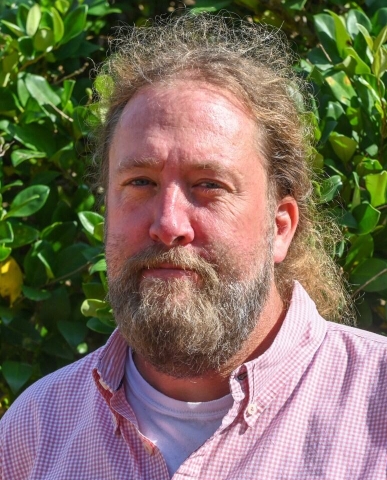
Stephen Carmody, Ph.D.
Co-Founder and Director of GAPS
Dr. Carmody is an anthropological archaeologist whose research focuses on the prehistoric use of plants in both religious and economic contexts in the southeastern U.S. His specialization in paleoethnobotany allows him to use plant remains recovered from archaeological sites as a lens into the human-environmental dynamics of the past. His primary research interests involve exploring the cultural and social consequences of the origins of agriculture, past, present, and future. He also explores the use of plants in ritual and religious ceremonies. Stephen has worked on or led archaeological excavations in Alabama, South Carolina, Tennessee, and West Virginia.
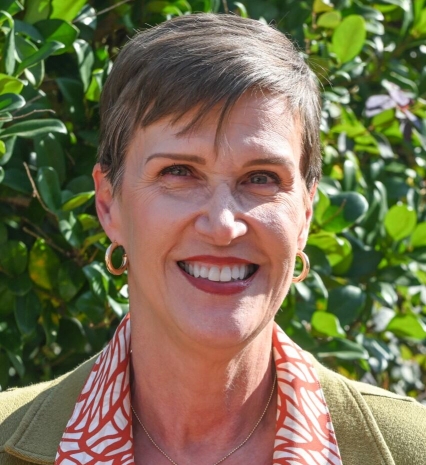
Kelly Berwager, Ph.D.
Director, Inmate Art
Dr. Kelly Berwager is a Lecturer in the Art and Design Department at Troy University. With 29 years of teaching experience, primarily with P-5 students, her expertise spans from elementary to college-level art education. Additionally, her 12 years teaching Visual Arts and Art Education courses at Troy University further demonstrates her depth of knowledge and commitment to developing future art educators.
Dr. Berwager is also a practicing artist whose works have been shown in local, regional, and international exhibitions. Her works range from large photorealistic acrylic paintings of confident women in luxurious clothing and elegant high heels to small collage works using vintage dress patterns, jewelry, and paper dolls. Both art media explore her pursuit of identity through the genealogy of material objects.
She joined the TROY-Tutwiler gardening program in 2021 and established an art curriculum, Inmate Art, to accompany the gardening aspects of the program. In addition to her contributions to the university's art and art education disciplines, she launched Inmate Art to partner with the gardening program, aimed at promoting sustainable gardening practices and fostering creativity through art and nature. Her work integrates art education with hands-on art projects, reflecting her commitment to both artistic development and social engagement.
Inmate Art, along with other prison art programs, offer numerous benefits, both for individual inmates and the broader correctional environment. It provides a constructive outlet for self-expression, allowing prisoners to process emotions, reflect on their experiences, and develop healthier coping mechanisms. Inmate Art also encourages critical thinking and problem-solving skills, helping the women at Tutwiler develop a sense of accomplishment and purpose.
The program has offered painting and drawing classes, along with multiple projects including printmaking, collage, embroidery stitching on photographs, Kintsgui ceramics, multi-media artworks. The women's artwork has been featured in two exhibits, including The Garden of Perseverance at Troy University's International Arts Center in 2022 and Roots of Hope at The Kelly Fitzpatrick Center for the Arts in Wetumpka, Alabama. The artwork has also been featured at the Alabama Bureau of Pardons and Paroles Changing the Course exhibition for the past three years.
Inmate Art received a grant from the Alabama State Council on the Arts in 2024 to further explore art-making by visiting artists in the prison. Plans are for local artists who use wood, ceramics, colored pencils, etc., to visit the women and work with them using media they might never have the opportunity to use.
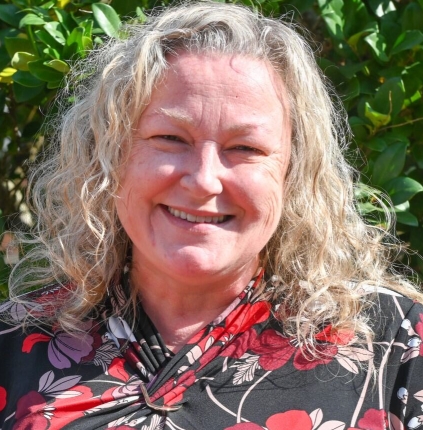
Sharon Everhardt, Ph.D.
Co-Founder and Former Director
Dr. Everhardt joined the Troy faculty in 2014. She teaches at both the undergraduate and graduate level. Her main research interests include the study of race, class, and gender, especially disenfranchised populations of women. In 2020, Dr. Everhardt earned certification as an AACS Clinical Sociologist who helps organizations and institutions resolve social issues related to the human condition. She is currently researching the impact of horticultural programs on nutritional knowledge and food insecurity among female incarcerated participants in women's correctional facilities. She has secured over $75,000 in USDA funding to support her gardens projects. In 2020, she spearheaded the pursuit of a 1.9 mil Department of Education's Strengthening Institutions Title III grant to improve student achievement and retention at Troy University. In December 2020, Dr. Hawkins awarded her with the Chancellor's Excellence Award for her grant work.
Further areas of interest include food, capital, self-sufficiency programs for low-income populations, and volunteerism. She enjoys incorporating service learning into her classes to allow students to gain real world understanding of the topics they are studying. Dr. Everhardt has been the recipient of numerous awards including the 2017 Teacher of the Year for Troy-Montgomery and the 2015 and the 2018 Troy-Montgomery Faculty Excellence Award.
2023 Images
2019 Images
2021 images
